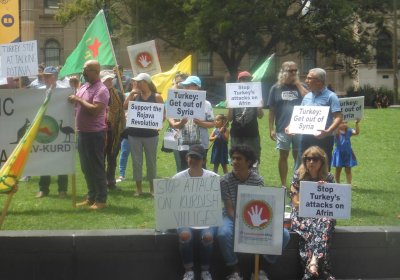Three years after Kurdish-led forces liberated the northern Syrian city of Kobane from ISIS — after a months-long siege that captured the world’s imagination — the democratic, multi-ethnic and feminist revolution in Syria’s north is facing a new assault.
Women's Protection Units (YPJ)
Afrin invasion: Turkey attacks northern Syria’s democratic revolution — with Russian and US approval
After receiving approval from Russia, the Turkish state has launched an air strike with 69 jets, bombing the Afrin centre and Cindirêsê, Reco, Shera, Shêrawa and Mabeta districts in northern Syria, ANF News reported on January 20.
Academics and international human rights activists launched a petition calling upon world powers to act against Turkish aggression against Afrin, ANF News reported.
The umbrella organisation of political and social movements in northern Syria, Movement for Democratic Society (TEV-DEM), released a statement on recent attacks and threats by the Turkish state.
Turkey has attacked the Afrin district in northern Syria, which is part of the Northern Syria Democratic Federation that is seeking to create a new revolutionary system of “democratic confederalism”.
Syrian Democratic Forces (SDF) finally liberated Raqqa, in northern Syria, from ISIS occupation on October 17, after a battle of 135 days. In 2014, ISIS declared Raqqa its capital, which makes its defeat a decisive event.
The SDF is a multi-ethnic and multi-religious armed force made up of dozens of militias that is committed to the political project of “democratic confederalism”, the participatory democratic project associated with the Kurdish-led Rojava Revolution.
The flags of the Women’s Protection Units (YPJ) and Shengal Women's Units (YJS) were planted in the city centre of Raqqa, which had been the capital city of ISIS, on September 14.
Flanked by military commanders, Iraqi Prime Minister Haider al-Abadi was in the nation’s second-largest city, Mosul, on July 10 to announce the city’s liberation from ISIS.
An end to the three-year-long rule by the extremely violent and authoritarian terrorist group is obviously good news for the city's residents. But it seems unlikely the group’s defeat will mean an end to their suffering, which began long before ISIS captured the city in June 2014.
A conference on the Rojava Revolution will be held as the struggle in northern Syria enters perhaps its most critical phase.
“The Rojava Revolution in Northern Syria: An experiment in radical democracy, feminism & ecology” will be held in Melbourne on June 30 and July 1. The event aims to inform participants about the revolutionary process, to discuss the problems it faces and to build support for it.
Turkish war planes launched air strikes against Syria and Iraq on April 24.
For months local and foreign forces have been closing in on the main ISIS strongholds: the cities of Raqqa in Syria and Mosul in Iraq. Turkey is a NATO member and recognised as an ally against ISIS by the US-led coalition of Western powers in Iraq and Syria, that includes Australia.
But the Turkish air strikes did not target ISIS. Instead, they were aimed at the terror group’s most consistent opponents — left-wing Kurdish-led revolutionary forces.
United States warships in the Mediterranean Sea launched a large cruise missile strike against government-held airfields in Syria on April 7. They fired about 60 Tomahawk missiles on the Shayrat air base near Homs in central Syria as the US government called for Syrian President Bashar al-Assad to be removed from power.
Revolution in Rojava: Democratic Autonomy & Women’s Liberation in Syrian Kurdistan
By Michael Knapp, Anja Flack & Ercan Ayboga (translated by Janet Biehl)
Pluto, 2016
285 pp., $38.95
Rojava, which is Kurdish for the “west”, is to be found in Northern Syria. In the middle of a conflict zone, marked by the war against the Assad regime, a Turkish invasion and ongoing conflict with the brutal jihadists of ISIS and al-Nusra, the Kurds and their allies are creating a new kind of democratic system.
New international talks aimed at ending the Syrian conflict may be unlikely to succeed, but they do mark shifts in the alignment of competing forces.
The United Nations Security Council unanimously voted on December 31 to support a ceasefire in Syria that started the previous day. The latest round of international peace talks are scheduled for January 23 in the capital of Kazakhstan, Astana.
- Previous page
- Page 3
- Next page











